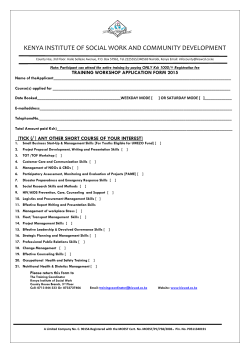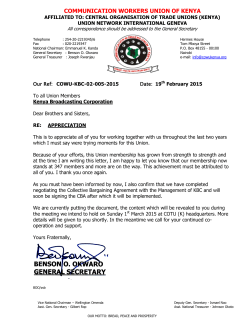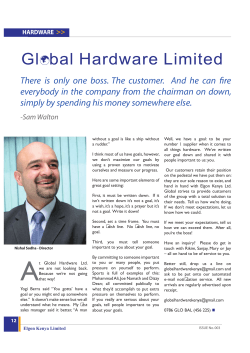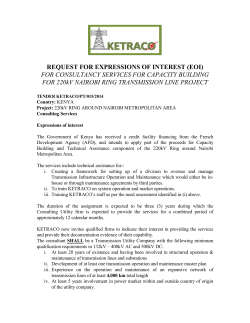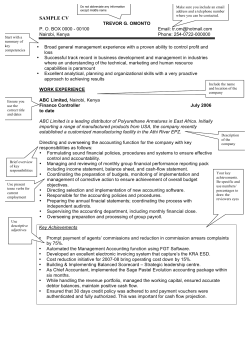
Spring 2015 Newsletter
Volume 15, Issue 1 Newsletter Celebrating 21 Years of Work in Africa ! Spring, 2015 1994 saw the start of construction on a two room school in Zaire (now, the Democratic Republic of Congo, DRC) in a village with no electricity, wells, toilets or literacy. Myrt School now includes preschool through high school and is rated the best on all levels in the Katanga Province based on national exams. WaMbuyu Tech is rated tops by by the Belgian Technical Corporation. In 2012, projects were added in Mali, Cameroon and Kenya. Read about the projects below and on our website, http://AbleAndWilling.org. Able & Willing is searching for volunteers to teach at any level or train teachers at Myrt schools in Congo. Food and lodging is furnished. Call Able & Willing 301-685-3282 A Word From The Founder The years seem to fly by so fast that I wonder if the work I do in Congo will ever be finished, or if there will be others to pick up where I leave off and keep the progress going. For some while now I have come to realize that there are more years behind than ahead of me. Every day that I wake up and see sunshine reminds me that I have one day less in life to accomplish my goals. My work is my mission in life. Nothing makes me happier than doing what I think will help make the world be a better place, especially the place where I was born. For twenty years, I have returned there to work towards that goal. I thought my years of experience in building schools and community in Katanga D.R.C. had taught me all I needed to know about what to do next, but my last time there was full of surprises and new challenges. One of the worst things I saw happening was the exploitation of children by their own parents – a longstanding problem that seems to resist solutions. It seems that too often when people are born and raised in poverty and hopelessness, they pass that view of the world and those expectations to future generations. And so, they ensure the perpetuation of selfdefeat and resistance to change. The probAWIEF P.O. Box 4303 Frederick MD 21705 lem is worsened by the old African tradition of equating children with wealth – a tradition that developed centuries ago when it made sense for children to start working at a very young age hunting, fishing, growing things for the family to feed itself. In modern times this is no longer true, but too many people still hold those old attitudes. The result? Children on the street doing anything they can to make money for the family instead of being in school. I have also gained new insights into how people’s attitudes have been twisted by the legacy of colonialism. In Katanga, this means the Belgian mining interests, which they needed local workers with health and skills. To that end they offered a lot of stuff for free to their workers – food, housing, education, water, electricity. The more children a worker had, the larger the amount of “free” food and other stuff the family received. Too many people still cling to expectations based on old traditions plus new ones that arose during life under colonial rule – expectations that no longer work. Mining contributes few jobs and little else to the wellbeing of ordinary people. The city is overrun with too many 301-685-3282 continued on page 3 http://AbleAndWilling.org Volume 15, Issue 1 Page 2 Mali Moringa Project Pays Off! Mamadou Dia has seen great improvement in the health of 41 young children who completed the Moringa for health program he started with a small clinic in the village of Manabougou, Mali. He is pleased that 15 more children were enrolled during his last visit and will soon be on the road to health. And he is positively delighted about a new source of funding that will expand the program to more rural clinics! Moringa to Pay for Health Programs! It turns out that the new source of funds will be the Moringa itself. Mamadou found a great demand in the local markets for his well-packaged Moringa powder. He calculates that there is sufficient demand for the product that he can market a portion of his current crop to pay for improving his farming operation and support more treatment programs for children’s health. He is particularly excited that he will at last have the money to build a firewall around the farm. Wild fires are a constant threat in the dry season and wiped out much of his farm produce in 2012. We Thank You! The Mali-Moringa project and Able & Willing would like to thank all and each one of you who have donated/dedicated funds to the project in the past. The dozens of children who have regained their health are saying thank you and will forever be grateful for your kind support. We are pleased that this project is within reach of obtaining our goal of self-sufficiency. Spring, 2015 About the Moringa Project in Mali The Moringa oleifera tree is fast growing with highly nutritious leaves and seeds, loads of vitamins, minerals, 3 amino acids essential for infant development. DiaFarms is a legal entity in Mali set up to grow and process Moringa products to improve children's health by working with local clinics Mamadou Dia is an AWIEF board member and owner of DiaFarms, dedicated to improving plant and livestock varieties for better nutrition in Africa. Above: five of the children who completed the health program. Left: Mother with child to be enrolled in the next health program REVE Kandale Project Now Independent from AWIEF After nearly two years of working with Able & Willing, Greg and Colette Ramm have decided to concentrate their energy on REVE Kandale, a project that they started while living in England. “We really appreciate working with board members and friends of Able and Willing as we made the transition from London to Bethesda, Maryland,” Greg recalls. Greg and Colette first met in the village of Kandale, Zaire (now, the Democratic Republic of Congo) in 1981 when they were both teaching in a public school. They are both committed to reviving the schools in the area that had long since deterioGreg and Colette Ramm rated. We are impressed by their progress so far and wish them success in fulfilling their dream. Volume 15, Issue 1 Page 3 Spring, 2015 ...continued from page 1 pointless to spend what little money they have jobless people. The land and rivers are too deon formal schooling for their children. graded or privately held to provide much food for the taking. Nothing is free. All of this is breaking my heart. Let me reassure you – I still see the light through the dark. In Lubumbashi today, many children spend I am still dedicated to doing all I can in the time their days on the streets walking around with God gives me. I still believe that change and baskets of goods on their heads, selling anyprogress are possible, that education is the thing - peanuts, corn, donuts, fish - you name key, and that, with your help, we can make a it – till night comes and they give their earnings difference. Thank you so much for all your to their parents, have one meal of the day, go help, and let us all keep up the good work in to sleep, and get up the next day and do it all this journey I call Life. over again. Attitudes towards educating children are also changing. Because jobs requiring education are so few, and since so many of those good jobs are monopolized by people with political connections, more and more people think it’s Mbuyu Wa Mbuyu (Puma) Myrt School & WaMbuyu Tech Highlights Mbuyu left for Congo in June, 2014, along with Nyota and Kiluwe, his children, and John White, an old friend and former Peace Corps Volunteer. (See AWIEF Newsletter, Fall 2014). Mbuyu continued in Congo until February, 2015 and made considerable progress, despite a limited budget. Here are some of the accomplishments and the work that will continue when he returns in July, 2015. Guest house and campus gates. The new bus stop at Myrt School campus made it necessary to put up a gate to control outside interference. The guest house is on the left side of the gate (see picture at right). The guest house has a kitchen, living room, two bedrooms and a balcony on the second story and is finished except for some electrical work, furniture and septic tank. Offices and a public food service is on the first floor. Cost to finish: $3,000. Lecture room A lecture room with seating capacity of over 60 is on the second floor of the building at right. The science labs are on the first floor. The large lecture room allows for efficient planning of guest lectures, special topics, and community meetings. 2014 work included finishing windows, floors, and painting. Finishing electrical work and new seating are scheduled for 2015. Estimated cost: $3,500. Volume 15, Issue 1 Other Myrt School highlights Page 4 • Foundation for 3 classrooms was built. Spring, 2015 tion Program. Cost $35 per child for uniform, shoes, school supplies and tuition. • A section of the security wall was built in the most vulnerable area and serves as exterior walls for the 3 classrooms. • Scouting For Education Program: for grade levels 7 and up. Costs vary by grade level to cover uniform, shoes, school supplies, tools and safety equipment. • Girls Tech Ed Scholarships: 3 girls received, making a total of 7. • Books for Myrt Library • First Aid Certification: 3 day instruction for teachers and students in the Scouting program. • Orphans Scholarships and Parents Work For Educa- Radical plans for Myrt computer lab The plan is to expand the lab with 30 identically configured ThinkPad laptops, a network server, and improved Internet connection service. The radical part is that what’s inside the workstations and server is a total break from expensive (or pirated) proprietary software, such as Microsoft Office or Windows, to 100% free open source software. Puma’s big challenge: community market In addition to the usual projects to improve the Myrt Schools and local communities, Mbuyu (aka, Puma) was “blessed” with a unique opportunity to organize 1,000 women and 200 men to build a community market, without pay. At the request of a local Catholic Church that donated the land near Myrt’s main campus, Puma organized the women and men to invest sweat equity to build the market in exchange for a spot for a market stall. Between directing the often unruly crew and battling powers set to co-opt the market, Puma had the challenge of his lifetime. For years, the villagers near Myrt School have been looking for a way to get a new community market so they can sell their goods. Here in the U.S., we may think of a community market as a place to where we • Boy and Girl Scouts: 3 day regional jamboree hosted by Myrt Schools. • Soccer equipment for local league. Many benefits of moving to open source software include cost and security, but, more importantly, will prepare students for the open source environment which increasingly dominates the world of technology. The laptops (purchased for $10 each) have been tested and are ready, pending last minute updates to the master hard drive that will be duplicated to each laptop. Jim Carpenter is configuring the server to optimize network performance and educational material. can buy organic farm produce on the weekends. In most of Africa, the community market is place to purchase anything from used shoes to a sack of beans and is open seven days a week. A stall in the market is a highly valued asset. The basic challenge was to establish rules that are firm and fair to assure that the project remains a grass roots effort of local people exchanging labor for a spot for their own stall in the market. Sounds simple but problems came on two fronts. (1) Some people tried everything to get out of labor, e.g., offering Puma money instead of labor, claiming to be sick,… (2) Outside powers (wealthy men, gov. officials, …) wanted a piece of the action for various reasons like the ability to reward their cronies with a spot sans labor. There is a lot more to the story, including standoff between bulldozers and 1000 women, but that is the gist. Pictures above: (left) 1200 volunteers clear 3+ acres for community market; (right) final stages of clearing. Volume 15, Issue 1 Page 5 Spring, 2015 Acquiring Land for a Special Needs School in Kenya Maggie Lusweti is taking the first steps to create a school for kids with special needs in Kenya. With the help of relatives and friends in Kenya, she has located a parcel of land in a strategic location. Now, to check on the legal status of the property. Fortunately, Maggie knows a lawyer in Kenya that she can trust - her uncle. This is a lesson that Puma learned the hard way in Congo. Over 20 years ago, Puma hired a layer to obtain a deed for the school property that he had acquired from the village chief, only to learn several years later that the deed was a forgery. The deed is now solid but it would have definitely caused a lot of trouble and expense. Prospective site for a school for children with special needs, located in in Bungoma County, western part of Kenya. Testing M-Pesa money trasnfer service The cost of a Certificate Of Official Search is $700. Maggie and Jim used this opportunity to check out the revolutionary M-Pesa, the world leader in mobilephone based money transfer, pioneered in Kenya with astounding success. Jim easily transferred $10 instantanously to the cell phone of Maggie’s mother in Kenya for a mere 99 cent fee (the same fee applied to any transfer amount). But sending $700 raised flags and was eventually denied after Jim explained the purpose and the fact that he didn’t personally know Maggie’s mother. The 99 cent fee no longer exists. It now costs $5 to send any amount from your own bank account up to about $750 max with 3 day deleay. Much higher rates apply for instantaneos transfers that must be paid by credit card. Children with special needs in Kenya Maggie Lusweti knows a thing or two about the lack of educational opportunities for kids with special needs in Kenya. She grew up in a large extended family in Kenya and both of her parents were teachers. . Maggie’s father rose to become a founding member of the Kenya National Union of Teachers, the largest teachers trade union in Kenya. Maggie’s passion for education was ingrained in her from childhood. In her last visit with her two sons to see her father before he lost his battle with cancer, she visited several schools that her parents continued to help in their retirement. She noted that Kenyan schools lack any services for children with developmental delays. She had no trouble finding and interviewing special needs kids that were totally abandoned by the educational system. Cameroon School Project Athanasius Awasom, our newest board member, reports that the new school building (right) is now finished except for interior work and desks. We’ll post an update with pictures on our website, http://AbleAndWilling.org, when we receive the full report. The name of the school is Success Primary School and is located in Mankon village, Bamenda District, North West Region, Cameroon. Started in 2010 by Awasom brothers, the school is still operating in rented facilities in need of repair. Volume 15, Issue 1 Page 6 PLEASE JOIN US FOR A TASTE OF AFRICA Spring, 2015 Buffet of favorite African dishes Sunday, June 14, 2015 3:00 - 5:00 p.m. WAY STATION 230 W PATRICK STREET, FREDERICK, MD 21701 Suggested donation $25 for dinner to support our projects Recycle Electronics & Shred Documents Saturday, May 9, 2015 9 a.m. - Noon Jefferson Ruritan Community Center 4603 B Lander Road, Jefferson, MD 21755 Protect the environment (Just off of U.S. 340 exit, next to Jefferson Volunteer Fire Company) Cooperative fundraising event with Jefferson Ruritan Club Voluntary tax deductible donations support your choice of Education Projects in Congo of Able & Willing Scholarship Fund of Jefferson Ruritan Club Protect your identity Please Help The parents in these villages are able and willing to work on building the schools. The students are able and eager to learn. New African board members are committed to new projects for building schools, improving the environment, and growing nutritious food. Please continue your partnership with Able & Willing and invest in a better future in Africa. I would like to make a tax-deductible contribution of $_______________ You may select one or more projects to support: As needed Myrt School projects in Congo Kenya Projects Send to: AWIEF P.O. Box 4303 Frederick, MD 21705-4303 or donate securely online My Address: Please use my email to save postage and printing: Cameroon Projects ___________________________________________________ Able & Willing International Education Foundation, Inc. is a 501(c)3 non-profit, non-religious, all-volunteer run organization. All contributions are tax-deductible. For a copy of our current financial statement, please write, phone or email us. 2015-04 AskUs@AbleAndWilling.org 301-685-3282 http://AbleAndWilling.org
© Copyright 2025
